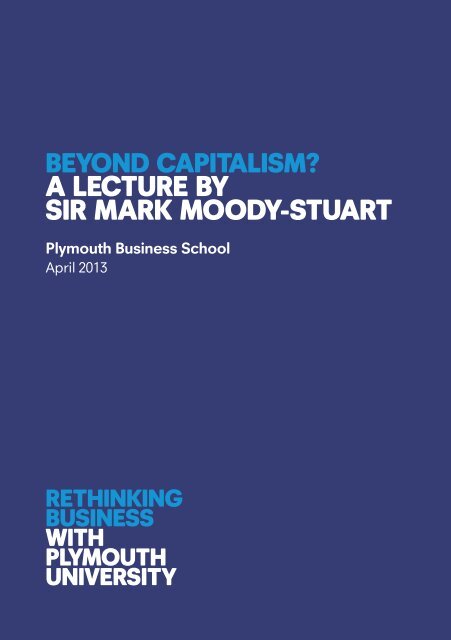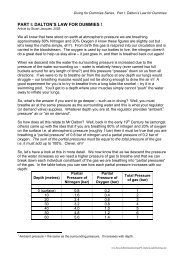Download a .pdf of Sir Mark Moody Stuart's full Beyond ... - Plymouth
Download a .pdf of Sir Mark Moody Stuart's full Beyond ... - Plymouth
Download a .pdf of Sir Mark Moody Stuart's full Beyond ... - Plymouth
Create successful ePaper yourself
Turn your PDF publications into a flip-book with our unique Google optimized e-Paper software.
BEYOND CAPITALISM?A LECTURE BYSIR MARK MOODY-STUART<strong>Plymouth</strong> Business SchoolApril 2013RETHINKINGBUSINESSWITHPLYMOUTHUNIVERSITY1
not all <strong>of</strong> them admirable. The question arises as to what, if anything, a corporationshould do if a government is not taking steps to address certain issues or is pursuingwhat appear to be misguided policies. Do corporations have any role in helping tobuild “political will”? I will return later to another <strong>of</strong> Tony Juniper’s major concerns – thenegative impact on society <strong>of</strong> continuously widening gaps in wealth. This is a concernwhich I share with Tony.My own views on the role <strong>of</strong> corporations in relation to governments are shaped inpart by observing changes in developing economies with different sorts <strong>of</strong>governments. In such economies civil society organisations <strong>of</strong>ten feel that majorcorporations should use their undoubted influence to induce governments to adoptwhat are perceived to be better practices. By contrast in more developed westerneconomies civil society organisations generally regard any attempt by corporationsto influence government behaviour as inappropriate and unacceptable. I believe thata consistent approach is needed.I have lived in ten countries and visited natural resource operations in another thirtyor so. I have been able to see the impact <strong>of</strong> resource revenue on development overtime. When I first worked in Oman in the sixties as a field geologist, it was a mediaevalcountry. There were only a couple <strong>of</strong> doctors for a million people, the disabling eyedisease trachoma was rife, education was basic or non-existent, female genitalmutilation common. In the intervening years, based on oil income, with a change <strong>of</strong>ruler and wise government, Oman has become a modern country, with a reasonabledistribution <strong>of</strong> income, an excellent education system, medical care to be proud <strong>of</strong> andan elected Majlis or parliament with women represented, with 10 percent women inthe upper house.In the same period Malaysia has been transformed from an economy dependent onprimary resources – oil and gas, tin, palm oil and rubber - where race determined bothperceptions and generally the actualities <strong>of</strong> occupations to a modern economy with astrong light manufacturing base, a sound educational system and a society where onecan no longer guess occupation from race. The revenue from oil and gas and otherprimary products has been used wisely to build this modern economy.In Nigeria on the other hand, the outcome and application <strong>of</strong> income from oil and gasdevelopment has been less happy. Oil revenues have <strong>of</strong>ten been misapplied and insome cases stolen through corruption. There are divisions in society as argumentsdevelop over the allocation <strong>of</strong> revenue expenditure to different parts <strong>of</strong> the country.What has caused these different outcomes? In each case, the main oil companywas the same, operating with similar people and to similar principles. The actions <strong>of</strong>companies, both positive and negative, undoubtedly had some impact, but the realdifference has come from the characters and motivations <strong>of</strong> the government leadersinvolved. Oman and Malaysia have been blessed with leaders with very clear visionsand commitment to development, providing frameworks within which business andcivil society operate. You might not agree with the political system in either case, butthere is no denying the results. Nigeria on the other hand has suffered from frequentchanges <strong>of</strong> leadership, normally by military coup, with leaders whose agendas have<strong>of</strong>ten been more personal than national. The present democratic government ismaking some progress in the battle to establish sound and uncorrupt governancesystems, but it is a tough battle and the corrupt funds available to opponents <strong>of</strong>change are large.But government alone is not enough – different parts <strong>of</strong> society need to co-operate.In Malaysia, perhaps as a result <strong>of</strong> staring into the abyss <strong>of</strong> racial slaughter in 1969,different ethnic groups have developed working compromises. In Oman, it has beenpossible to build on strong social and religious structures. In Nigeria, the creativity andenergy <strong>of</strong> civil society is evident in the way that in response to a severe deterioration <strong>of</strong>the education system, people have got together to start their own schools. Religiousinstitutions are strong and family cohesion and support systems are something whichwould benefit this country. Yet without a government framework providing basicstructure services, much creativity has gone in less socially constructive directions.You do not know how dependent society is on government until you experience thelack <strong>of</strong> it.What are the limits to corporate influence on governments?If effective government and functioning civil society are essential components <strong>of</strong>development, what <strong>of</strong> corporations? What are the limits <strong>of</strong> their role? When I joinedShell in the sixties, the involvement <strong>of</strong> ITT in developing country politics was an issueand the activities <strong>of</strong> United Fruit had given rise to the epithet “banana republic”.Corporate concerns were to avoid involvement in political activity in any form. In theseventies, I and many <strong>of</strong> my colleagues believed that if a company ran an efficientoperation with sound staff development, employment, safety and environmentalpolicies, did not bribe anyone, paid our taxes honestly and in the country whereincome was earned and engaged in a reasonable amount <strong>of</strong> community development,our responsibilities stopped there. The Economist newspaper still holds this line,8 9
expressing in a cover story a few years ago the concern that companies mightmisguidedly take on responsibilities <strong>of</strong> host governments and vice versa. They stated“it is the job <strong>of</strong> elected politicians to set goals for regulators, to deal with externalities,to mediate among different interests, to attend to the demands <strong>of</strong> social justice, toprovide public goods and collect the taxes to pay for them, to establish collectivepriorities where that is necessary and appropriate and to organise resourcesaccordingly”. This is fine as an aspiration, but what about the large areas <strong>of</strong> the worldwhere governments are either incapable or unwilling to carry out this role, or worsestill, steal the means by which they are supposed to carry out the task? Where theproceeds <strong>of</strong> industry, particularly extractive industry, are mis-spent or mis-applied overlong periods by governments, people turn to the company and say “You made money,but there is little in the country to show for it.” To protest that we paid our taxes is <strong>of</strong> noavail. It may not be our responsibility, but it becomes our problem. If we want the sort<strong>of</strong> functioning society in which we can do business, we need to work with others tocreate the capacities and conditions which sound governance requires.Drawing the line <strong>of</strong> responsibility is difficult. Some time ago I had a discussion inLondon with a minister <strong>of</strong> a country in which the company I worked for played a majorrole. He asked me to intervene to try to stop the irregular activities <strong>of</strong> certain peoplein his country. We had, as a matter <strong>of</strong> deliberate policy and principle, avoided anyconnection with their activities and the minister knew it. When I pointed out that thiswas no concern <strong>of</strong> mine, that it was not my country or my government so why me, hereplied that when it all went wrong I could guess whose fault it would be seen to be.At first this seemed to me to be unfair. But was it so unfair? We were friends <strong>of</strong> thecountry. Had the issue been a natural disaster, or even a social issue for the nation, wewould have immediately <strong>of</strong>fered to play our part. Is it the act <strong>of</strong> a friend to avert one’seyes and walk down the other side <strong>of</strong> the street when a crime is being committed, justbecause it is not our business?It is clearly in the interests <strong>of</strong> both society in the country and in the long run <strong>of</strong> acompany working in that society to lend assistance where possible. It is difficult torun an effective business in a country with a fractured society. However, I still believethat it is not appropriate for individual businesses to try and impose their views ongovernments. Nobody elected us. I am also strongly opposed to businesses makingpolitical payments to support particular parties. All the companies with which Ihave been involved have had firm policies opposing making political payments. Onthe other hand where appropriate it is important that a company should make itsown views plain openly and publicly, with the reasons behind the position. This is acontribution to an informed public debate.Would coordinated action by businesses be more acceptable? Even where industrylarge and small can reach agreement on a policy, I think that there is always a dangerwhere business in isolation expresses a view that this view will be biased in favour<strong>of</strong> business. Even where this is not the case, there will be a lingering suspicion thatthere are commercial interests behind the opinion. Incidentally, I think it is equallyunacceptable for organised labour to try and impose its will on an elected governmentby strike action.Alliances between corporations and civil society organisationsDoes this mean that business should simply sit on the sidelines? I think that in thelast fifteen years or so there have been a number <strong>of</strong> issues where business and civilsociety have come together to address a particular problem. This suggests a fruitfulway forward. These alliances between business and civil society started in relationto trade and consumers, for example with WWF and Unilever working together onsustainable fisheries or through the Forest Stewardship Council. Other initiatives havesince developed. Arising from the “Publish what you pay” campaign by Global Witnessand the Soros Open Society Foundation, the Extractive Industries TransparencyInitiative was launched by the UK government and is now hosted by the Norwegiangovernment. It involves oil, gas and mining companies publishing what they payto host governments and the host government declaring what they have received,both being independently audited. It may be possible to extend this transparency tothe vitally important ultimate use <strong>of</strong> the government revenue. To its great credit, theNorwegian government has itself signed up to the initiative, weakening the charge thatthis is just a case <strong>of</strong> the global North dictating their values to the South.Similarly the Kimberly Process, which grew out <strong>of</strong> concerns over the use <strong>of</strong> diamondsas a source <strong>of</strong> funding for conflict, now covers 99 percent <strong>of</strong> diamond productionand prevents the fuelling <strong>of</strong> conflict. In another example, the Voluntary Principles onSecurity and Human Rights were developed through co-operation between the UKForeign Office and the US State Department, with involvement <strong>of</strong> major companiesand human rights NGOs. The Voluntary Principles provide agreed guidelines for theuse <strong>of</strong> armed security, the evaluation <strong>of</strong> risk and the steps to be taken if governmentforces are used. Proper application <strong>of</strong> these principles helps protect companies fromaccusations <strong>of</strong> complicity in human rights abuses.10 11
There are two big advantages <strong>of</strong> business and civil society, and indeed organisedlabour, working together in this way. First they keep each other honest. Input from civilsociety organisations prevent the initiative being distorted in favour <strong>of</strong> purely businessinterests while business involvement ensures that the result is practical. Second, acombination <strong>of</strong> business and civil society is more likely to be trusted than either inisolation, although civil society organisations engender much more trust that doesbusiness. I believe a coalition <strong>of</strong> business and civil society organisations can togetherinfluence governments. Many such joint initiatives demonstrate to governmentspractical and acceptable ways forward and make such initiatives more likely to beacceptable to the public at large.If business and civil society organisations are to work together they need to build trustbetween them as well as with the public at large. An important step in this process isfor businesses to report on their performance, not just financially, but on their impacton society and on the environment. This can be done using standardised indicatorssuch as those developed by the Global Reporting Initiative (GRI). These indicatorsare developed by a very transparent public process involving representatives fromNGO’s, UN agencies, labour organisations, and companies. Reporting should coverthe whole scope <strong>of</strong> a company’s activities. Inevitable shortfalls in performance canbe put in the context <strong>of</strong> overall performance. Clearly it is best if these indicators areindependently verified. The GRI also develops guidelines for specific industry sectors,NGOs, governments and local governments. The GRI itself, some local governmentsand some NGOs now issue GRI compatible reports on their own activities, joiningcompanies from all around the world in building what has become a global standard.There are now efforts led by the International Integrated Reporting Council to workwith regulators to develop models <strong>of</strong> how companies report publicly on all factorsaffecting the value <strong>of</strong> their business, whether economic, social or environmental. Thisis an effort to address the concerns mentioned by Tony Juniper that purely financialreporting does not reflect the real overall value <strong>of</strong> the company, although it does notgo the lengths that he suggested to convert everything into a monetary figure. I do notbelieve that this is either possible or even desirable.The United Nations Global CompactAt the World Economic Forum in Davos in 1999, K<strong>of</strong>i Annan called for businesses tocommit themselves to a Global Compact based on nine principles reflecting themajor UN conventions on human rights, the environment and labour standards.A tenth principle on corruption was added later. Over seven thousand companies inone hundred and forty-five countries have committed themselves publicly to theseprinciples, making the UN Global compact the world’s largest voluntary corporatecitizenship and sustainability movement. Part <strong>of</strong> the genius <strong>of</strong> K<strong>of</strong>i Annan was that heinvolved civil society and labour organisations in the process. The Compact provides aforum where businesses, civil society and labour organisations can develop practicalapproaches to the delivery <strong>of</strong> the high level principles.Initially, as a voluntary organisation, the Compact was criticised by some as being justtalk, or “blue wash”. But when companies sign up they commit, in a letter supportedby the board <strong>of</strong> the company, to report publicly on what they are doing to try toembed each <strong>of</strong> the principles (covering human rights, the environment, workingconditions and anti-corruption) into their day to day operations. These so called“Communications on Progress”, <strong>of</strong>ten also in line with the GRI reporting principles,are available for public scrutiny. Whether or not they are independently verified,companies can be held to account by civil society organisations based on thesereports. If a company fails to report within a certain period <strong>of</strong> time, it is delisted fromthe Global Compact. Many companies have been delisted. This has done much for thecredibility <strong>of</strong> the movement.While the Global Compact remains voluntary, there are many encouragements apartfrom the interest <strong>of</strong> consumers and civil society organisations for a company to applyitself seriously to supporting all the principles <strong>of</strong> the Compact. A spin-<strong>of</strong>f from theCompact is a group <strong>of</strong> over a thousand long term investors who have committedthemselves to an initiative called the Principles for Responsible Investment (PRI).This group, which between them have over thirty trillion dollars worth <strong>of</strong> fundsunder management, commit themselves to taking into account the principles <strong>of</strong>the Global Compact and reporting in line with the GRI in making their investmentdecisions. At the same time many <strong>of</strong> the other voluntary initiatives on environmentaland social sustainability developed by civil society organisations with business havebeen incorporated over time into the Performance Standards <strong>of</strong> the World Bank’sInternational Finance Corporation (IFC). Compliance with these standards is not justnecessary for companies working with the IFC or using IFC or World Bank loans, butis also a condition for receiving project finance for major projects financed by any <strong>of</strong>the more than seventy banks who have signed the Equator Principles, another initiativedeveloped by banks and civil society organisations working together.In these various ways, the activities and investments <strong>of</strong> companies in countriesall around the world are being gradually brought into compliance with standards12 13
developed internationally with the involvement <strong>of</strong> both businesses and civil society,regardless <strong>of</strong> the state <strong>of</strong> local laws or their enforcement. While this ongoing processis not a substitute for properly enforced legislation and regulation in each and everycountry, it does provide international standards on which local laws can be based aswell as demonstrating locally to all that such standards are entirely compatible withsound commercial business. International capitalism has come a long way from theimage <strong>of</strong> companies seeking pr<strong>of</strong>it without standards.Perhaps the most important contribution <strong>of</strong> the UN Global Compact is thedevelopment <strong>of</strong> Global Compact Local Networks which bring together companieslarge and small, national and international with civil society and labour organisations towork together to address the particular priorities <strong>of</strong> that country. There are now UNGCLocal Networks in more than a hundred countries. Companies can learn from eachother and larger companies can work with smaller companies in their supply chainto promulgate the standards <strong>of</strong> the Global Compact. There are active networks in allcontinents. There are over three hundred GC signatories in China and an active LocalNetwork. There is a Local Network in formation in Burma/Myanmar and there was anactive one in Syria.I believe that where different sections <strong>of</strong> society – businesses, civil societyorganisations, labour organisations, faith based organisations and in some cases citiesor local governments - can work together, we can begin to strengthen the “politicalwill” in countries, whatever their system <strong>of</strong> government. The Local Networks <strong>of</strong> the UNGlobal Compact are one method <strong>of</strong> drawing people together to work with commonobjectives, but there are others. The combination is much stronger thanany one group acting in isolation. It is also a mechanism for increasing the chancethat capitalism and markets work in directions broadly aligned with the overall needs<strong>of</strong> society.The problem <strong>of</strong> the wealth gapIn his introductory lecture, Tony Juniper pointed to the problem that in many cases,overall growth <strong>of</strong> economies has led to a widening <strong>of</strong> the gap between rich and poorwithin a single country, leading to stress and a lack <strong>of</strong> harmony in society. This iswell illustrated in China, a country which in recent years has lifted literally hundreds<strong>of</strong> millions <strong>of</strong> people out <strong>of</strong> poverty and made a larger contribution to meeting theMillennium Development Goal on poverty reduction than all other countries puttogether. This has been achieved by the remarkable progress after Deng Xiaopinglaunched the “Reform and Opening Up” process thirty-five years ago, after the horrors<strong>of</strong> Mao’s Cultural Revolution. The remarkable achievements <strong>of</strong> this “Socialist <strong>Mark</strong>etEconomy with Chinese characteristics” have come at considerable environmental andother costs, freely and honestly admitted in the <strong>of</strong>t quoted description <strong>of</strong> the economyby the then Premier Wen Jiabao as “unbalanced, uncoordinated and unsustainable”.One <strong>of</strong> the side effects has been a very large widening <strong>of</strong> the wealth gap. I understandthat China now has more has more billionaires than any other country.Is this inequality an inevitable by-product <strong>of</strong> capitalism and the market economies?While very large differences certainly do lead to strains, I believe that most peoplewould accept that differences in pay for different jobs are reasonable. Competitivemarket considerations, scarcity or surplus <strong>of</strong> people able to do the job, the amount <strong>of</strong>training required, and the value added by the individual all play a part in determininghow much an individual is paid. One might think that the overall value to society atlarge <strong>of</strong> an individual’s work might also play a role, but in real life this is not the case,or only very remotely so. To further complicate matters, many people, including myself,believe that people doing the same job should not automatically receive the samereward; there should be some variation with the quality <strong>of</strong> performance.Different origins <strong>of</strong> inequality in capitalist market economiesInequality at the top end <strong>of</strong> income arises in three different ways, and I suspect thedegree <strong>of</strong> strain caused depends not just on the magnitude <strong>of</strong> the difference butalso on what caused the difference. You have to begin by defining how the inequalityarises, because that makes a big difference. The first is caused by old wealth, inheritedwealth, which has been with us always and always will be. With some notableexceptions old wealth keeps its head down and is not particularly visible. The secondkind <strong>of</strong> inequality is generated by entrepreneurs, owner/operators such as Bill Gatesor the founders <strong>of</strong> Google or Facebook. I think that this form <strong>of</strong> wealth differential,in general, doesn’t cause issues. Most people consider that these are people whoinvested their own money, took risks, retained a share and maybe got people coinvesting.Their wealth fundamentally comes from a significant shareholding insomething they created, which will eventually elide into old wealth as it did with aRockefeller or Carnegie.I suspect, but I may be wrong, that few people begrudge the wealth <strong>of</strong> those peoplewho are owner-operators, who made money by innovating or inventing somethingwhich society wants. People accept that someone like that might be a multi-billionairewhile other people are working for normal wages in the organisation, provided theyhave good working conditions and interesting work. The differential is not seen14 15
as relevant because the difference is between an owner, a capitalist as it were, anentrepreneur, and the work force. Of course, how the wealth was made, whether ina reputable or disreputable way, and in addition to what use it is put does make adifference as to how they are perceived.Where the issue <strong>of</strong> inequality comes to the fore is with regards to a third group <strong>of</strong>people who are essentially managing public companies. They run and administercompanies owned by other investors. Such people may be very creative and by theirefforts they may grow the company and add a great deal <strong>of</strong> value to it, but they remainemployees and stewards <strong>of</strong> other people’s capital. The current issue in this country hasrisen because in the last ten or fifteen years there has been a growth in the differentialbetween these people at the top <strong>of</strong> major public companies and those within thecompany or in society at large. I think that is where the strains begin to grow. If on top<strong>of</strong> that there are issues resulting from failures <strong>of</strong> these major organizations, in otherwords, fundamentally a failure to steward the investment, the problem is exacerbated.Everyone in the Western world has a stake in such companies, in the form <strong>of</strong>investments through pensions, through employment directly or in suppliers,so society’s feeling <strong>of</strong> betrayal in the case <strong>of</strong> failure is then greater. The problemexisted before the current downturn, it not just because <strong>of</strong> major failures. It was quiteclearly growing over the last decade or more and not just in banks.In the last ten or fifteen years there has been a tendency for the base salaries atthe top <strong>of</strong> major organizations to rise. In this country, for example, senior executivesalaries have tended to grow in the five to ten percent range. Wages in theorganization as a whole have tended to grow more in line with inflation or inflation plusa bit, say four percent. If you do that for ten years, it exaggerates the difference andis manifestly unsustainable. You can’t go on doing that forever. This differential wasfurther exacerbated by increased amounts <strong>of</strong> performance-related pay at the top <strong>of</strong>companies, with additional bonuses and long-term incentives. Such schemes hardlyexisted in the UK in the eighties. People designed remuneration structures whichreflected short-term and long-term performance.Some possible solutionsHaving served on the remuneration committees <strong>of</strong> several companies I think that thestructure <strong>of</strong> pay at the top <strong>of</strong> corporations should be radically simplified. The complexlong term share incentive schemes which pay out after several years should beabolished. The structure should be quite simple with base pay and an annual bonusbased on clearly defined annual targets, some <strong>of</strong> which could be annual milestones onthe road to longer term targets. The bonus should be payable largely in shares whichwould have to be held for very long periods, probably to retirement. In this way there isgenuine alignment <strong>of</strong> interests between executives and long term shareholders.This however only addresses the relatively easy part <strong>of</strong> the problem, aligning pay withperformance. It does not address the major problem <strong>of</strong> the excessive differentialsbetween the employees at the top <strong>of</strong> a company and the average employee. It is thisdifferential which causes the major strains and feelings <strong>of</strong> inequity in society.The first step that needs to be taken is to prevent the differential widening further.As a result <strong>of</strong> adverse publicity and the challenging economic climate, furtherwidening <strong>of</strong> the differential has largely halted and in fact there have been reductionsin the overall amounts rewarded. These reductions are quite large in financial terms,but given the size <strong>of</strong> the gap, the absolute differential remains great.The available leversThere are four levers which could further reduce differentials in future. There could beconcerted action by shareholders. There could be agreement between companiesin certain sectors such as the financial sector to reduce competition. Public outragecould make large differentials socially unacceptable. Lastly, legislative controls couldbe introduced.One cannot place too much reliance on that as shareholders have for many yearshad considerable powers which they have generally not used. Furthermore, the fundmanagers representing many shareholders are <strong>of</strong>ten themselves the beneficiaries <strong>of</strong>the same remuneration systems so have little incentive to press for radical change.In spite <strong>of</strong> this, there are encouraging signs that shareholders are beginning to playan active part in addressing the issue.It is unlikely that companies will unite to agree common policies in relation toremunerations policies, not least because this would be illegal under competition law.This means that efforts by individual companies to lead the market downwards willhave to rely on shareholders to encourage spread <strong>of</strong> better practice other companies.Public outrage, or the threat <strong>of</strong> public outrage, has undoubtedly had an effect.A number <strong>of</strong> individuals have waived large bonuses or been happy to accept lessthan their previously agreed entitlements for fear <strong>of</strong> a public outcry. Although publicand media outrage is capricious and it is the most visible and not the most egregiousrewards that draw attention, there is a cumulative effect which begins to make the16 17
most excessive payments socially unacceptable. Public outrage has an effect not onlyon the highly paid individuals, but on those directors on remuneration committees whoagree to the awards and also on shareholders. It does therefore have an effect wellbeyond the individual cases which draw attention.The fourth lever is action by governments in the form <strong>of</strong> regulation or taxation.Consider regulation first. Executive remuneration would appear to be an area wherethe market is either not operating very efficiently, or even if it is, it is delivering sociallyundesirable results. Following the line <strong>of</strong> argument which I used earlier, might this nottherefore be a place where the market might be guided within a regulatory framework?The efforts at regulation by the European Union and Switzerland by capping bonusesappear to me to be examples <strong>of</strong> regulations which mandate the method to be appliedand not the outcome. A number <strong>of</strong> companies set limits or targets for the maximumproportion <strong>of</strong> revenue which can be used for employee remuneration. For example,banks are compared on cost/income ratios, where costs are largely employee costs.Such proportions vary by industry. A possible regulatory framework would be torequire all companies to have the proportion <strong>of</strong> revenue paid to employees subjectto mandatory approval by shareholders. This could be coupled with mandatorypublication <strong>of</strong> the ratio <strong>of</strong> some measure <strong>of</strong> senior executive pay to the average payin the organisation. As shareholders are already able to influence or approve seniorexecutive remuneration, this would place the onus for agreeing an equitable split <strong>of</strong>the revenue on shareholders and open to public scrutiny the gap between averagepay and top pay and whether this was increasing or decreasing. In a complex arealike this, such an approach would be preferable to governments directly attemptingto fix pay. The measures indeed complex, but companies would have the flexibilitywithin such a framework for determining the most appropriate split for that companyin that industry.Some would say that a more direct intervention by government in the form <strong>of</strong> taxationis justified. I believe that most people support a progressive income tax systemas well as a welfare system which provides a safety net for those unemployed orotherwise unable to support themselves. It should be remembered that some <strong>of</strong>those unemployed, even when the economy is in a favourable state, find themselvesin that position because <strong>of</strong> the continuous change in employment and the structure<strong>of</strong> businesses which is brought about by capitalism and the market economy. This isone <strong>of</strong> the inevitable side effects <strong>of</strong> the creative dynamics <strong>of</strong> such economies and itis therefore reasonable that proper provision should be made for it. Having said that,we already have a progressive tax system in which the top one percent <strong>of</strong> taxpayerspay almost a quarter <strong>of</strong> the income tax collected, and the top ten percent pay overhalf <strong>of</strong> the total collected, more than enough to cover the entire welfare bill. Thebalance <strong>of</strong> such issues is best determined by the democratic process, bearing in mindthat excessive or wasteful welfare expenditure is almost as divisive in society as areunjustified excesses <strong>of</strong> remuneration.The difficult issue <strong>of</strong> ensuring that the wealth gap in society is not so large as tocause strains will thus probably have to depend on an interplay <strong>of</strong> shareholder action,leadership by responsible companies and executives, public opinion and perhapsgovernment action if we are to arrive eventually at a stable and sustainable position.In other words, society as a whole will have to arrive at an agreement as to what issocially acceptable.Business needs to work with others in society –capitalism and markets are just mechanismsThat is a theme which has run through this lecture. In the opening lecture <strong>of</strong> this series,I heard Tony Juniper say that capitalism and the market had some role to play asmechanisms in the delivery <strong>of</strong> a more sustainable future, but not in an unadulteratedform. Perhaps surprisingly, I certainly agree that on their own they are not sufficient todeliver a well functioning society. For this we need business, civil society organisationsand others to work together. This is as important for sound business as it is for all <strong>of</strong> usin society.<strong>Plymouth</strong> University is committed to providinginformation in accessible formats.If you require this publication in an alternative formatplease contact:<strong>Plymouth</strong> Business SchoolTel: 01752 585805Email: pbsgateway@plymouth.ac.ukWeb: www.plymouth.ac.uk/pbs18 19
WITHPLYMOUTHUNIVERSITY20
















